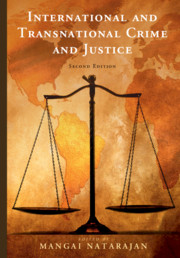Book contents
- International and Transnational Crime and Justice
- International and Transnational Crime and Justice
- Copyright page
- Contents
- Figures and Tables
- Preface
- About the Editor
- Notes on Contributors
- Introduction
- PART I OVERVIEW: TRANSNATIONAL CRIME
- PART IA Varieties of Transnational Crimes
- PART IB Transnational Organized Crime
- PART IC Factors that Facilitate Transnational Crimes
- 37 The Globalization of Crime
- 38 Routine Activities and Transnational Crime
- 39 Political Aspects of Violence A Criminological Analysis
- 40 Migration, Crime, and Victimization
- 41 Culture and Crime
- PART ID Transnational Justice Matters
- PART II OVERVIEW: INTERNATIONAL CRIME
- PART III OVERVIEW: INTERNATIONAL AND TRANSNATIONAL CRIME RESEARCH
- World Map
- Index
- References
39 - Political Aspects of Violence A Criminological Analysis
from PART IC - Factors that Facilitate Transnational Crimes
Published online by Cambridge University Press: 20 June 2019
- International and Transnational Crime and Justice
- International and Transnational Crime and Justice
- Copyright page
- Contents
- Figures and Tables
- Preface
- About the Editor
- Notes on Contributors
- Introduction
- PART I OVERVIEW: TRANSNATIONAL CRIME
- PART IA Varieties of Transnational Crimes
- PART IB Transnational Organized Crime
- PART IC Factors that Facilitate Transnational Crimes
- 37 The Globalization of Crime
- 38 Routine Activities and Transnational Crime
- 39 Political Aspects of Violence A Criminological Analysis
- 40 Migration, Crime, and Victimization
- 41 Culture and Crime
- PART ID Transnational Justice Matters
- PART II OVERVIEW: INTERNATIONAL CRIME
- PART III OVERVIEW: INTERNATIONAL AND TRANSNATIONAL CRIME RESEARCH
- World Map
- Index
- References
- Type
- Chapter
- Information
- International and Transnational Crime and Justice , pp. 235 - 239Publisher: Cambridge University PressPrint publication year: 2019

